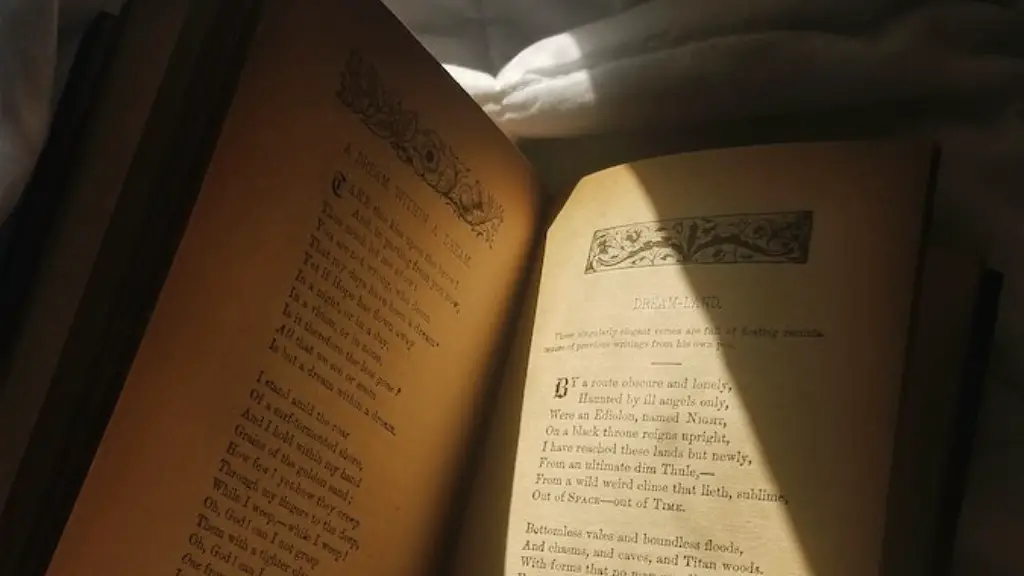How to Approach Poetry
Poetry has been long appreciated and held in high regard by generations all over the world, which is why it’s still essential to understand how to approach the form. Many individuals find poetry difficult to approach but the more you learn about it, the easier it is to appreciate its power and beauty. This article will discuss the fundamentals of how to approach and appreciate poetry.
First and foremost, it helps to be open to the possibility that you’ll like the poem and find value in it. Find a quiet place, read the poem several times, and ponder the meaning behind the words. Although this may initially seem daunting, reading and evaluating poetry is an effective way to learn more about the genre and complete a task. This can provide insight and build critical thinking skills.
It’s critical to be patient and mindful when interpreting a poem. Take your time reading and understanding the text. Once you have a good understanding of the poem, identify the topics, emotions and images it conveys. Additionally, pay attention to the underlying message in the poem. Once you understand the message, evaluate the techniques and methodologies that the author has used to accomplish it. Taking the time to appreciate the strategies used in the poem allows you to enjoy it on a much deeper level.
The structure of the poem should also be taken into account. Analyze the amount of stanzas and how they are divided into a well-structured pattern. This can help to reinforce the poetry’s message and bring insight into the author’s perspective. In addition, pay close attention to the rhythm of the poem; syllables help form the unique poetic flow, creating a distinct atmosphere and mood.
Critically analyzing the poem allows you to explore the ideas and solutions suggested in the poem. Ask yourself what the poem is trying to say, and how the piece makes you feel. Keeping an open mind and exploring the poem further will give you a clearer insight into what the poet intended and how their piece makes you feel. Furthermore, keep an open dialogue with fellow poetry enthusiasts and friends who will help you to identify and appreciate the poem’s beauty.
There are many tips and tools available to help approach and appreciate poetry, such as reading and researching to gain experience, playing with ideas and trying to find hidden meanings and themes, reading out loud to use the rhythm of the poem to better understand the words and their emotion, and spending time with the poem to fully appreciate its beauty. The insights gained from these steps can be the difference between just reading a poem, and truly engaging with it.
Exploring Poetry’s History
Considering a poem’s history can bring depth to an appreciation of the text. Exploring the context behind the poem’s creation increases the understanding of what the poet was trying to communicate and how the poem was received when it was originally published. Discovering the origin of the text can provide inspiration and insight into the poet’s mindset, sometimes making it easier to appreciate the poem and its message.
Moreover, the reading of classical poetry is invaluable in understanding poetry techniques, as they often contain a pivot of ancient techniques with modern approaches. This helps to gain an appreciation of the changes that have taken place in the writing of poetry over time, such as in language, syntax, themes, and emotions. Additionally, exploring the history of a poem will help you to understand what the poet was trying to communicate, and how that affects the interpretation of the poem today.
For further research, biographies of authors of classic poetry can teach valuable lessons and provide personal insights, helping an individual better understand the work and the person behind it. Paying attention to the life and experiences of the poet can also inspire creativity, improving the writing techniques and imaginative drive of an individual.
Reading Poetry Criticism
By engaging with poetry criticism, individuals can gain a fuller, more nuanced understanding of poetry, the author and what the poem is trying to communicate. This will also provide greater insight into the discussion and historically accepted meanings of a poem. When reading poetry criticism, it is important to research and to be aware of the cultural, political and social context of the time. Such an approach helps individuals to better understand the poem and its message.
Furthermore, literature reviews offer an in-depth analysis of poetry and related themes, as well as an overview of the poet, their historical background, and the reception of their work. Conducting a review can offer unique research perspectives, which can enable an individual to further explore the meaning and message of the work. It is crucial, however, to remain objective and avoid taking a stand in the critic that may be too biased.
Engaging with the world of poetry criticism does not only provide insight, but can also help to create an emotional connection to the poem. Such criticism can help an individual understand the specific intent and original emotional significance of the poem. Combining the experience with the academic approach to poetry appreciation can also enrich an individual’s appreciation, deepening their power of reflection.
Introduce Poetry to Others
Interpreting, analyzing and critiquing poetry allows an individual to gain a better understanding of the text and the poet’s creative process. Discussing and presenting the poem to others is a great opportunity to gain insight into their interpretations and perspectives.
Exploring the poem with different perspectives allows for it to be appreciated in a new light. Presenting the poem in a different format, such as art or theatre, can be particularly valuable as it gives a more vivid and accessible understanding of the poem without requiring a reader to be an experienced scholar. Utilizing different visual, sonic and symbolic representations of the poem allows for the poem to be experienced in its full potential.
In addition, discussing a poem in a group setting provides the opportunity for enriching conversations, exchange of ideas and perspectives. Exploring a poem in such a setting enables a fuller appreciation of the text. Furthermore, you can use the discussion of a poem to help younger generations to develop an appreciation of literature. Such conversations also enable an individual to grow as a writer.
Create Your Own Content
Gaining an understanding of poetry and its techniques will further inspire individuals to write their own poems. Exploring the existing literature can serve as a source of inspiration and learning. Taking time to practice and reflect on the creative process is a great way to gain insight into one’s own creative capabilities and to apply the same techniques used by professional poets.
Maintaining a journal of daily experiences, thoughts and people is a great way to gain insight into what one enjoys in life and can inspire unique outlooks. Exploring and experimenting with poetry can improve an individual’s understanding of the medium and how to effectively incorporate personal narrative in order to convey a message. Taking time to reflect upon the steps and learn from the process can improve an individual’s writing skills and hone their unique perspectives.
Additionally, engaging with the work of other poets is a great way to observe and appreciate their craftsmanship as well as gain insight into their processes. Successful poets can provide guidance and advice, while viewing the practices of established poets can help to create an individual’s own voice. Through supporting the creative works of others, individuals can gain an understanding of the inspirational journey of poetry appreciation.
Value the Experience
Ultimately, it is important to build an appreciation or the craftsmanship that goes into poetry. Enjoying and expressing one’s appreciation of poetry means not only understanding, but connecting with and recognizing the beauty that comes from the writing and the form itself. Valuing the unique literary experience that poetry creates is essential to remaining dedicated to the art form.
Expressing a physical response to the appreciation of a poem is a great way to truly understand the value and emotion of the piece. Listening actively and focusing on various elements of the poem, such as the rhyme, imagery, and language of the piece, can help an individual connect with the text on a more meaningful level. Additionally, memorizing a poem and being able to recite it is an effective way to gain insight into the writer’s structure and to connect with the content more deeply.
It is essential to remember that poetry appreciation is not a one-time activity. Practice, dedication and experience is essential for a true appreciation of the form. By taking the time to follow the steps outlined above, individuals can develop a meaningful relationship with poetry and gain a greater understanding of the art form as a whole.





